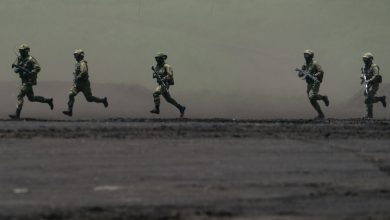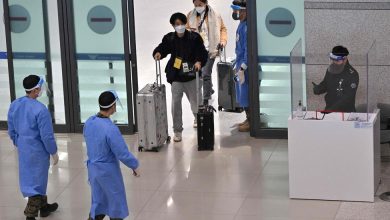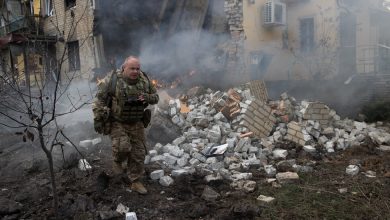An Urgent Mission for Literary Translators: Bringing Ukrainian Voices to the West

As Russian forces breached the border with Ukraine late last month, Kate Tsurkan issued an urgent call for help on social media.
Tsurkan, a translator who lives in Chernivtsi, a city in western Ukraine, wanted to give international readers a glimpse of what ordinary Ukrainians are experiencing — and to counter President Vladimir V. Putin’s claim that Ukraine and Russia “are one people” by highlighting Ukraine’s distinct literary and linguistic heritage.
What she needed, she said, was to get Ukrainian writers published in English. She needed translators.
The response was swift and overwhelming: Messages poured in from translators and writers like Jennifer Croft, Uilleam Blacker and Tetyana Denford, and from editors who wanted to polish and publish their work. As the war escalated, so did their effort. Soon, they had a dedicated group of literary translators — who often spend years working on books for small academic presses — speed translating essays, poems and wartime dispatches.
“We need to elevate Ukrainian voices right now,” said Tsurkan, an associate director at the Tompkins Agency for Ukrainian Literature in Translation, or Tault.
Bringing nuanced and reflective writing from Ukraine and about the war to English-language audiences is a project as political as it is cultural, several translators and Ukrainian authors said.
Part of Putin’s justification for the invasion rests on his claim that he is “liberating” culturally Russian areas from Ukrainian rule. By highlighting Ukraine’s vibrant literary and linguistic heritage, translators hope to emphasize the country’s distinction from Russia, and to draw attention to a rich cultural landscape that could be endangered under occupation by the forces of an increasingly authoritarian leader.
“Translation in times of great historical upheaval becomes especially important,” the Ukrainian poet and translator Ostap Slyvynsky, who lives in Lviv, wrote in an email. “Over the last decade, we have finally learned to tell the world about ourselves, opposing to what was once Soviet and now Russian propaganda. The world has finally seen Ukraine and understood us a little.”
The push to quickly translate work by Ukrainian writers has led to a loosely coordinated campaign among a small, close knit community of literary translators. Much of the communication is happening in group chats, social media, and shared Google drives and spreadsheets.
“It does help people who are suddenly stuck under bombardment to feel that their voices are being heard,” said Boris Dralyuk, the editor in chief of The Los Angeles Review of Books and a translator of Russian and Ukrainian authors who has been commissioning, editing and publishing war dispatches and poetry from Ukraine. “It helps to humanize this experience, to know what’s going through the person’s mind.”
For Dralyuk, who grew up in Odessa, giving Ukrainian writers visibility in mainstream publications, and not just in rarefied academic presses and journals, feels not only urgent but overdue. Russia’s military aggression against Ukraine has been going on since Putin annexed Crimea in 2014; a robust body of recent Ukrainian war literature already exists, Dralyuk said, but has gotten very little attention.
Russia’s ongoing aggression over the past eight years prompted some prominent Ukrainian writers, including the poet Boris Khersonsky and the novelist Olena Stiazhkina, who had previously written in Russian, to switch to writing exclusively in Ukrainian, as both a political and a literary statement, Dralyuk and other translators said.
“It’s been this long struggle for Ukraine both politically and culturally to establish and recover its identity,” he said. “Now we see this demarginalization and centering of Ukrainian voices, and it’s very empowering.”
As violence and chaos engulfed parts of Ukraine, the laborious process of commissioning and translating work has become even more complicated. Some of the authors are facing aerial bombardments and an escalating ground war. Others have enlisted in Ukraine’s territorial defense forces or are volunteering to help house and feed refugees.
To facilitate the rapid translation effort, Zenia Tompkins, who founded the Tault agency in 2019, reached out to Tsurkan, and started a project they called “Operation Ukraine.” Tsurkan put out a call for work from Ukrainian writers and posted another message in English to recruit more translators. The Tault agency has 10 translators who specialize in Ukrainian, and the list of Ukrainians authors it works with has rapidly grown to around 100 Ukrainian writers, up from 13 when it was founded.
“The biggest issue now is the availability of translators,” Tompkins said.
For translators who are used to working at a glacial pace, and who often struggle to get attention from major magazines and publishers, the sudden demand has been dizzying.
“I’ve never been asked this much in my life to do so many translations,” said Daisy Gibbons, a translator based in London who specializes in Ukrainian literature and works with the Tault agency. “I’ve always had to batter down the doors of other people.”
This week alone, Tault’s “Operation Ukraine” project has yielded several new translations by well known Ukrainian authors, including an essay about the conflict by Ostap Ukrainets, which was translated by Gibbons and published in The Los Angeles Review of Books; an essay in The New Statesman about the cathartic power of foul language in wartime, by the poet and playwright Lyuba Yakimchuk, which was translated by Croft; and a rage-filleddispatch from Kyiv by Stiazhkina, translated by Ali Kinsella and published in Guernica.
In the essay, Stiazhkina described writing to friends and loved ones after every air raid siren to say, simply, “As of now, we’re alive.”
Russia-Ukraine War: Key Things to Know
Chernobyl nuclear facility. The International Atomic Energy Agency said that the defunct power plant had been disconnected from electricity, though there was no need for immediate alarm. A power loss could affect the facility’s ability to keep the water that cools radioactive material circulating and lead to safety issues.
Evacuation efforts. Russian and Ukrainian forces said they were working on a temporary agreement to allow evacuations from six cities. In Mariupol, attempts to negotiate a cease-fire have fallen apart amid artillery fire and bombing.
On the diplomatic front. Vice President Kamala Harris began a three-day trip to Poland and Romania, as the United States and its NATO allies urgently try to find a way to help Ukraine defend itself without getting pulled into a wider war against Russia.
The ruble’s descent. To prop up Russia’s currency, which has been declining as a result of Western-imposed sanctions, the Central Bank of Russia announced new rules for foreign-currency accounts in Russia, seemingly intended to curb people’s ability to convert rubles into other currencies.
Tault is also hiring translators to quickly assemble an anthology of work by around 20 prominent Ukrainian authors, which will be released in the United States by Deep Vellum Press this spring. Profits from the anthology, “Love in Defiance of Pain: Ukrainian Stories,” will go toward humanitarian aid for Ukrainians impacted by the war.
Other literary outlets and organizations are also responding to the crisis by giving Ukrainian authors a platform.
Last week, PEN America, a literary and free speech organization, held an online forum with several Ukrainian writers, including Andrey Kurkov, the president of PEN Ukraine. Kurkov’s novel “Grey Bees,” which was recently translated and published in English, is set in the Donbas region of eastern Ukraine, against the backdrop of a long-simmering conflict between Russian-backed separatists and Ukrainian forces.
Kurkov said he knew several writers who had joined the military, and others who were volunteering to help deliver food and other necessities.
“This society is learning to live and survive in a time of war,” he said at the event. “We are all focusing on helping.”
Olga Livshin, a poet and translator who grew up in Odessa and Moscow and now lives in Pennsylvania, and her friend Julia Kolchinsky Dasbach, a poet who was born in Ukraine and lives in Arkansas, recently organized “Voices for Ukraine,” a trans-Atlantic Zoom poetry reading. The event featured acclaimed Ukrainian poets, among them Khersonsky, Yakimchuk and Vasyl Makhno drew, drew some 800 attendees, and raised funds for Unicef and for writers in Ukraine.
Some of the poets joined from Ukraine and read poetry written in response to the invasion.
“So many of them are in a basement now, hiding,” Livshin said. “This gives them an opportunity to express themselves.”
Translators with Ukrainian and Russian language skills are also harnessing social media to give English speakers a real-time view of Russian and Ukrainian perspectives on the conflict.
On Twitter, an account called War in Translation has become a repository for English-language versions of street graffiti, videos, poetry and social media posts. It was created shortly after the invasion by Noah Sneider, an American journalist who covered Russia’s earlier military campaigns in Ukraine, and realized there was an appetite among English speakers for posts that reflected the reality of war. Within a couple of weeks, around 50 volunteer translators had joined the project.
Recent posts include a translation of an open letter from Russian historians calling for the end to the war, a profanity-laced bit of graffiti denouncing Putin on a building in St. Petersburg and a poem by Khersonsky.
In one video from Feb. 26, the acclaimed Ukrainian novelist and poet Serhiy Zhadan gave a tour of the Kharkiv literary museum, which became a makeshift bomb shelter as Russian forces targeted the city. Panning his camera across taped-up windows and piles of sandbags, he recited the museum’s address and said anyone who needed shelter was welcome.
At the end, he turned the camera toward his face, and said, “Such are the chronicles of Kharkiv literary life these days.”





